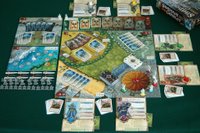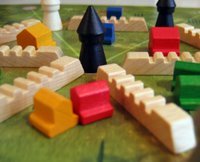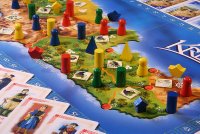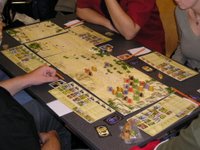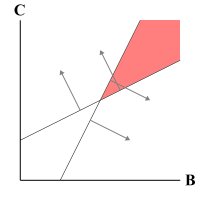
There are five big reasons I can think of that people would use
BGG: entertainment, community, altruism, research, buy/sell/trade. How can you make the most of your time at BGG in each of these areas?
EntertainmentThis is perhaps the most difficult one. Everyone has their own idea of a good time. For sheer
humor, you can read GeekLists and some
Session Reports, or hang out in some of the
subforums.
If you just enjoy reading various content, similar to reading a newspaper,
add the GeekLists, Forums, Game Forums, and Image modules to your front page. If you want to see content that other users have given "thumbs up", then select the
Hot view. If you want to see content chronologically as it was submitted, then select the
Recent view. If you want to see content chronologically based on the latest post, then select the
Active view.
CommunityBGG is part of an incredible community of gamers: young and old, serious and casual, euro and war, and of all nationalities and professions. The community is in constant contact through the writing and reading of content at BGG, other boardgame sites, blogs, and podcasts. I don't think it would be too far-fetched to say that BGG is the hub of most of this activity.
Even if you do not use the excellent
GeekChat interface, there is still the sense of community because of the content that is constantly streaming into the site. You can click refresh every minute of the day or night and see new stuff.
You can ask questions about game rules, and be answered (in some case, by the designer) within an hour. You can post a comment, thought, or suggestion, and get immediate feedback.
You can participate in
online games of Euphrates & Tigris and Auf Heller und Pfennig, and
Werewolf.
Users each have an online identity through the use of avatars, badges, supporter bar, tags, flags, and the recently-added micro-badges. User profile pages are overflowing with information. BGG also supports
GeekMail.
AltruismPeople submit content for many reasons: to rave about their favorite game, to hype up a game on the horizon that they are excited about, or simply to provide information that someone else can use. This type of content is not just limited to reviews and session reports. It also takes the form of users' game collections, ratings, and comments.
Other types of altruism occur in the forms of
GeekMod, GeekGold tipping, and forum feedback. Which game should I get? What's the name of this game? Where are the rules for Ticket to Ride? How do you break ties in Samurai?
ResearchIf information exists about a game, it's either on BGG, or BGG has a link to it. Whether you are looking for information on a specific game, or looking for a non-specific title, BGG is the place to start...and probably to finish.
Dive into the content. Read all the game stats: name, designer, publisher, playing time, number of players, ratings, weight. Read personal comments, reviews, sessions reports, general discussion, rules questions, variants, news, and rules. Look at images and files.
Get some
GeekBuddies. Don't just add your friends or users you like. Add users whose opinions are useful to you--good or bad. For any game you can find someone who loves it, and someone else who hates it. The important thing is how those users match your tastes, or how well those users put their opinions in context for you. A carefully-constructed GeekBuddy list makes the
Analyze feature very powerful.
Buy/Sell/TradeI don't do anything myself in this area, but it is quite active. The front page has modules for: eBay, GG Auctions, Marketplace, Trade Forums, and Trade Geeklists. Each game page has a Marketplace module as well. As with eBay, users are able to rate their experience with other users. For out-of-print and otherwise hard-to-find games, this is a great place to look.
MiscellaneousSupport BGG. It's
Aldie's full-time job. Throwing a few dollars his way means nothing to you, but means a lot to him and the community.
Use feeds. BGG is somewhat a victim of its own success. There's too much information for anyone to digest it all. BGG offers direct XML and
BlogLines links on game pages, user profile pages, as well as individual forums. Using feeds, you can get a single-page summary of all new material for the topics/games/users of interest to you. This eliminates the need to poll 100 places on BGG every day looking for new things. Note that this does not completely replace the value of "BGG surfing".
Take the road less traveled. Do not take the opinions of others as your opinion. Use their information, and make your own choices. Do not only look at the 50 top-rated games. Do not dismiss a game because it has a certain mechanic, or is designed by someone whose games you generally dislike. Make informed choices. Be willing to spend the time learning about games different from your normal selection. Ask someone to teach you a game you do not know.
Know your gaming group. If you are one of the people who buys games for your group, use your group's taste to help make decisions. I would rather play a game that's a "7" for me and have a great time, than a game that's a "9" for me and have a mediocre time.
May all your Meeples be red.
 So many casual gamers seem to play games as a mere exercise, or just to kill time. They would never think of trying to steal your city in Carcassonne or blocking your route in Ticket to Ride. Many lighter games have enough luck that such play styles go unpunished.
So many casual gamers seem to play games as a mere exercise, or just to kill time. They would never think of trying to steal your city in Carcassonne or blocking your route in Ticket to Ride. Many lighter games have enough luck that such play styles go unpunished.